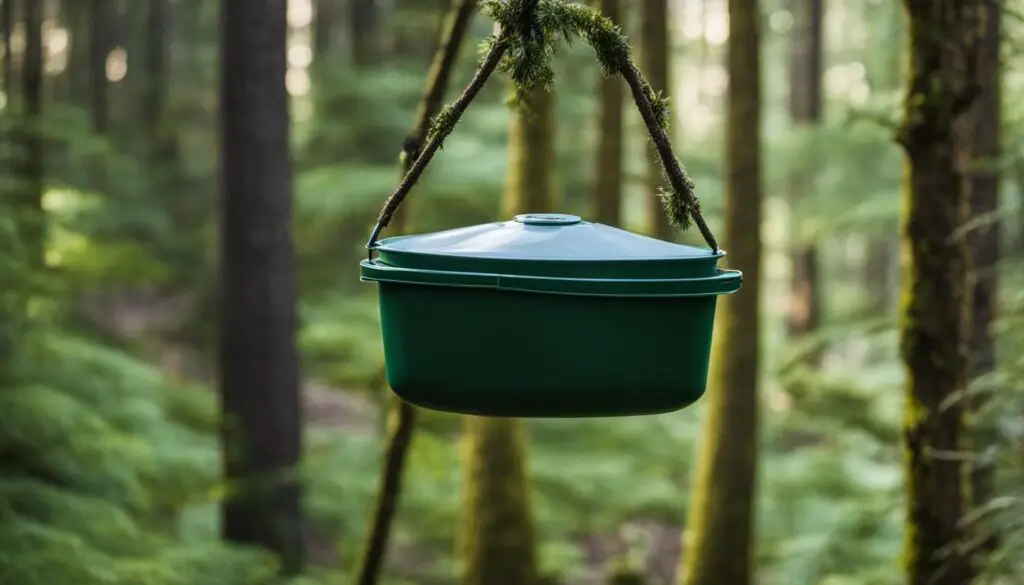When camping in bear country, it is essential to take precautions to protect your food from bears. Proper food storage not only prevents dangerous encounters but also safeguards bears’ well-being by reducing their reliance on human food sources. In this article, we will explore the best practices for camping food storage and bear-resistant food storage options to ensure a safe and responsible camping experience.
Key Takeaways:
- Proper food storage is crucial in bear country to prevent dangerous encounters and protect both humans and bears.
- Bear-resistant food storage options, such as bear canisters, are available and may be required in certain parks or campgrounds.
- Follow best practices for camping food storage, including keeping food within arm’s reach, avoiding storing it in tents or backpacks, and properly disposing of food waste.
- Use bear deterrents like bear bells or bear spray to further discourage bears from approaching your campsite.
- By being responsible campers and practicing bear safety tips, we can ensure the safety of both humans and bears in bear country.
Bear-Resistant Food Storage Options
When camping in bear country, it is crucial to have effective food storage options to prevent bears from accessing your food. Using bear-resistant food storage containers, also known as bear canisters, is highly recommended in areas where bear encounters are common. These containers are designed to be bear-proof, with features such as sturdy locks and reinforced materials that bears cannot easily break or open.
Table: Comparison of Bear-Resistant Food Storage Options
| Container Type | Pros | Cons |
|---|---|---|
| Bear canisters | – Highly effective at keeping bears out – Easy to use and transport |
– Can be bulky and heavy – May require additional storage space |
| Food lockers | – Provided by some parks – Convenient and accessible |
– Limited availability – Shared with other campers |
| Hanging food bags | – Lightweight and portable – Can be used in areas without bear canister requirements |
– Requires proper hanging technique – Bears may still be able to access food if not hung correctly |
If bear canisters are required or recommended in the area you are camping, it is important to choose one that meets the specifications provided by the park or campground. Some parks may provide rental services for bear canisters, making it more convenient for campers who do not wish to purchase their own. Remember to store your bear-resistant container at a safe distance from your sleeping area and away from the edge of cliffs or bodies of water, as bears may attempt to access it by pushing or rolling it.
Best Practices for Camping Food Storage
When camping in bear country, proper food storage is essential for your safety and to protect the bears. Follow these best practices to ensure a safe and enjoyable camping experience:
1. Use Bear-Resistant Containers
Invest in bear-resistant food containers, also known as bear canisters, that are designed to keep your food secure from bears. These containers are made of durable materials and have locking mechanisms that bears cannot easily open. Use them to store all food, cooking utensils, toiletries, and anything else with a strong odor that could attract bears.
2. Keep Your Food Within Arm’s Reach
Never leave your food unattended, even for a moment. Bears have a keen sense of smell and can detect food from a long distance. Keep your food close by, either in a bear-resistant container or in a designated food storage area. This way, you can quickly access it when needed and prevent bears from getting to it.
3. Avoid Storing Food in Your Tent
Never store food or any scented items in your tent. Bears can easily tear through tents in search of food, putting both you and the bear in danger. Instead, store your food away from your sleeping area, either in a bear-resistant container or in a designated food storage area provided by the campground.
4. Properly Dispose of Food Waste
When cooking and cleaning up, make sure to properly dispose of all food waste. Pack it out in sealed bags and dispose of it in designated trash containers. Do not burn food waste in the campfire, as the smell can attract bears to your campsite.
5. Use Bear Deterrents
Carry bear deterrents such as bear bells or bear spray with you at all times. Bear bells can help alert bears to your presence and may discourage them from approaching your campsite. Bear spray is a powerful deterrent that can be used to deter an aggressive bear if necessary. Make sure you know how to use it correctly before your camping trip.
By following these best practices for camping food storage, you can minimize the risk of bear encounters and create a safer environment for both humans and bears. Remember to always check the specific regulations of the park or campground you are visiting and follow them accordingly.

Conclusion
When camping in bear country, it is crucial to take proper precautions to ensure the safety of both humans and bears. By following bear safety tips and implementing bear-proofing strategies at your campsite, you can greatly reduce the risk of bear encounters and potential conflicts.
One of the key aspects of bear safety is to store your food properly. Utilizing bear-resistant food storage options, such as bear canisters or designated food lockers, is essential in preventing bears from accessing human food sources. Always check the regulations of the park or campground you are visiting to ensure compliance with the recommended food storage methods.
In addition to proper food storage, practicing best camping food storage practices is equally important. Keep your food within arm’s reach and never leave it unattended. Avoid storing food in your tent or backpack as bears have a keen sense of smell and can easily detect food odors. Properly clean your cooking utensils and wash dirty dishes immediately to remove any lingering food scents. Remember to pack out your food waste instead of burning it, and consider using bear deterrents like bear bells or bear spray to further discourage bears from approaching your campsite.
By being responsible campers and adhering to bear safety tips, we can coexist harmoniously in bear country. Remember to always respect wildlife and the natural habitat, and take the necessary precautions to ensure a safe and enjoyable camping experience for everyone.
FAQ
What is bear-resistant food storage?
Bear-resistant food storage refers to containers or methods used to safely store food in areas where bears are present. These containers are designed to prevent bears from accessing human food sources, reducing the risk of bear encounters.
Are bear canisters necessary for camping in bear country?
Depending on the park or campground regulations, bear canisters may be required for food storage. It is important to check the specific guidelines of the area you are visiting to determine if bear canisters are necessary.
Can I hang my food from trees to protect it from bears?
Some parks may allow visitors to hang their food from trees in designated areas. However, it is crucial to follow the regulations of the park or campground you are visiting, as different areas may have different guidelines for food storage.
What are the best practices for camping food storage?
When camping in bear country, it is important to keep your food within arm’s reach and never leave it unattended. Avoid storing food in your tent or backpack, properly clean cooking utensils and wash dirty dishes immediately, and dispose of food waste properly. Additionally, using bear deterrents such as bear bells or bear spray can further discourage bears from approaching your campsite.
Why is it important to store food properly in bear country?
Storing food properly in bear country is crucial to prevent bears from accessing human food sources. Improper food storage can lead to bears becoming conditioned to human food, losing their natural fear of humans, and exhibiting aggressive behavior. Proper food storage helps protect bears and reduces the risk of conflicts between humans and bears.

